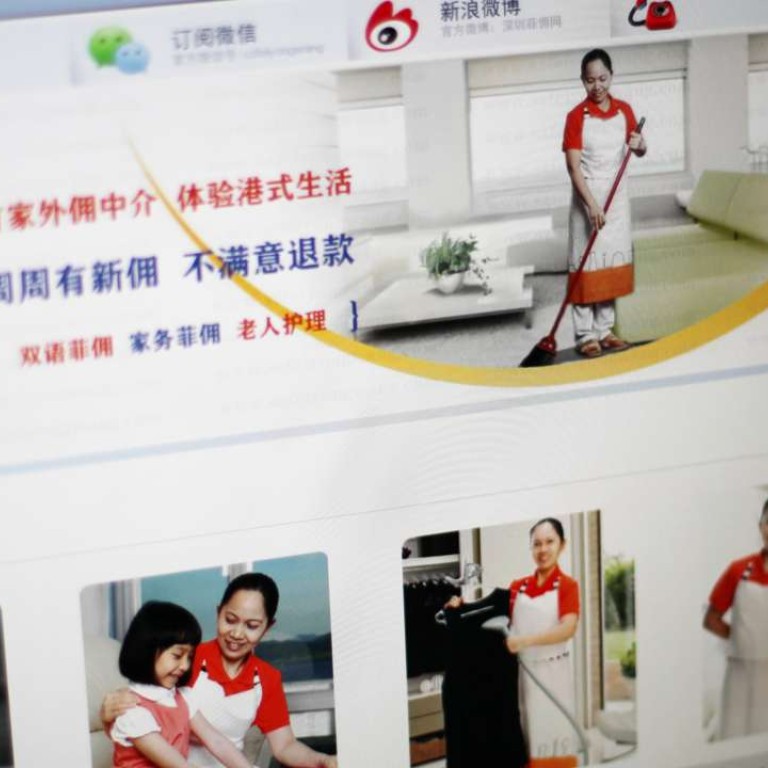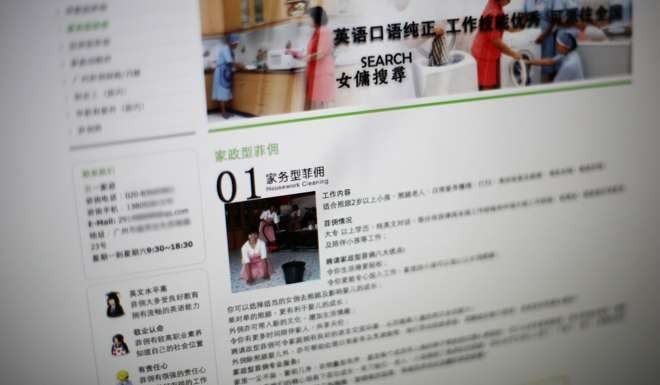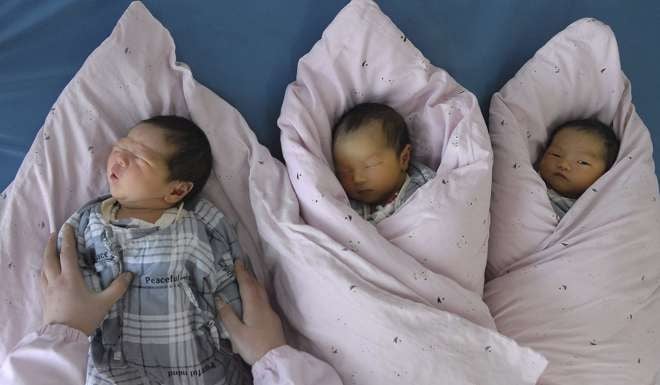
Is it time for China to open its doors to Filipino domestic helpers?
Those working illegally on mainland can earn twice as much as in Hong Kong
China’s growing demand for skilled domestic helpers offers the prospect of a new line of exchange between China and the Philippines as the two countries try to mend ties by playing down territorial disputes in the South China Sea.
While China has a particularly strict work visa system for foreigners wanting to work legally on the mainland, an estimated 200,000 Filipino domestic helpers are working there illegally. Philippine labour minister Silvestre Bello said last month that Beijing should legalise their stay and that he would raise the issue with the mainland authorities.
Bello said earlier this month that he would also urge Philippine President Rodrigo Duterte to discuss the issue of “undocumented” Filipino domestic helpers in China with the Chinese authorities. Duterte is likely to raise the issue during his visit to Beijing this week, according to the Philippine Daily Inquirer newspaper.
While there are 20 million domestic helpers in China, there’s still a huge shortage of supply, according to a report by the Ministry of Commerce. Most domestic helpers in China are middle-aged female rural migrant workers known as ayi (aunt), with little training or education.

Meanwhile, China has kept the door shut to foreign domestic helpers. In July last year, Shanghai began allowing foreign residents to legally hire domestic helpers from overseas. But Chinese citizens are not permitted to employ them, and reports said only five foreign domestic helpers had been granted approval to work in Shanghai by the end of last year.
Growing weary of hiring and firing Chinese domestic helpers who were poorly educated and ill-mannered maids, Shanghai advertising agency boss Shirley Yang said it was only natural that she began thinking two years ago about finding a Filipino domestic helper to take care of her twin babies.
“I had been using a mainland maid for some years,” she said. “They are from rural areas and have little education. What’s more, they have inappropriate manners, such as spiting on the ground while going outside and making noises while drinking soup.”
When she visited an American colleague’s home and saw their Filipino domestic helper looking after the house in a more professional way, she was impressed. After contacting employment agencies and scouring classified websites, she finally hired one herself.
“The Filipino ayi is much better than the Chinese one,” Yang said. “She really tidies up my house, mopping the floor every day and folds clothes neatly. She also likes playing with my kids. She also teaches them to learn do things by themselves” – a quality her Chinese predecessor lacked.

The commerce ministry report said the salaries of domestic helpers were rising rapidly in Chinese cities, especially for yuesao – nannies able to care for newborn babies. The monthly salary for a yuesao in Shanghai surged 27 per cent to 10,532 yuan (HK$12,126) in 2014.
That makes Filipino domestic helpers, also popular in Hong Kong, Singapore and Canada, even more competitive in Chinese cities, in addition to their professionalism and English-speaking abilities.
In big Chinese cities, a Filipino maid has become the very marketable asset for employment agencies. In Shanghai they can earn a 40,000 yuan commission when a client signs a three-year contract for a Filipino domestic helper. The salary is 7,000 to 8,000 yuan a month, which even at the lower rate is close to double the HK$4,210 minimum domestic helper salary in Hong Kong.
Without work permits, most Filipino domestic helpers enter the mainland on tourist visas that allow a stay of up to 14 days. After two weeks, those who stay illegally have to pay a fine when they leave the country.
“The mainland border control authority will fine them for overstaying, but the fines are often paid by us, the agencies,” a staff member at Guangzhou-based agency Maid Boss said.
Staying on the mainland illegally can, however, make overseas domestic helpers vulnerable to abuse and mistreatment. The Guangzhou employment agent, for instance, said she usually told Chinese clients “to take away the passports of Filipino workers” so that they could not “run away”, and she often told foreign domestic helpers working illegally on the mainland “not to talk to strangers”.

By skirting mainland regulations and visa rules, she said she had introduced more than 10 Filipino domestic helpers to Chinese families in Guangzhou, Fuzhou, Hangzhou, Shanghai and Shenzhen over the past two years. Some employers register foreign domestic helpers as office employees so that they can get work visas. Yang registered her Filipino domestic helper as an employee of her advertising agency.
Domestic helpers from the Philippines, and increasingly Indonesia and Myanmar, comprise one group of foreigners working illegally working on the mainland. Others include factory workers in the Pearl River Delta from Vietnam and Myanmar and merchants from Africa.
Despite having an increasingly rich and elderly population and a looming labour shortage, China remains determined to keep “low-end” foreign jobseekers out of the country. In big cities, up to half of the demand for domestic helpers cannot be met during the annual Lunar New Year holidays, according to a government report.
Xue Shuai, the founder of yunjiazheng.com, a website matching domestic helper supply and demand, said legalisation of Filipino domestic helpers would not have any impact on the market.
“It will be like a drop in the sea,” Xue said.
Meanwhile, although China has never publicly admitted it, it seems Beijing has been using visa controls on Filipino workers to put pressure on Manila, according to employment agents.

Tim Chen, who owns an employment agency in a southeastern coastal city on the mainland, said China had tightened visa controls when the Philippines took China to an international tribunal over their disputes in the South China Sea, with the pressure ramped up this summer when the tribunal in The Hague ruled against China.
So, if the domestic helper issue can be part of solving the Beijing-Manila puzzle, Duterte could bring it to the table.
Miao Lu, secretary general of the Beijing-based Centre for China and Globalisation think tank, said China could treat Filipino domestic helpers as “licensed technicians” to open the door.
“It’s likely Beijing will give the nod to the Philippines’ proposal to allow its domestic helpers to work in China legally because ... China is in badly need of such workers,” Miao said.

